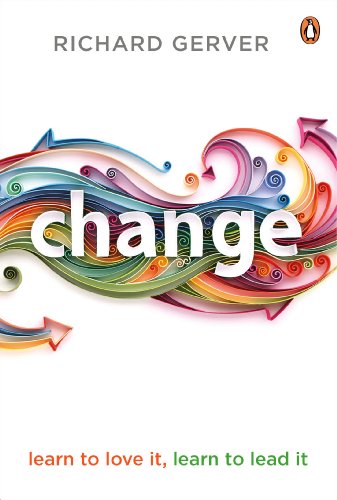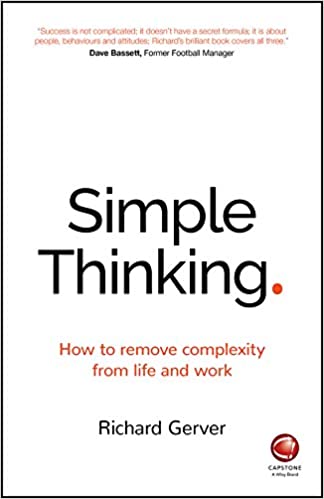State School Innovator Voice 2
Richard Gerver – Former Head at Grange Primary School
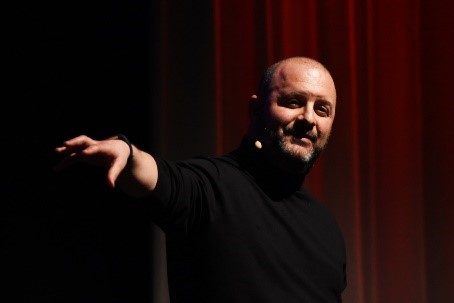
Richard Gerver has been described as one of the most inspirational leaders of his generation. He is an award-winning speaker, bestselling author (see links below) and world-renowned thinker.
Richard began his career in education, most notably as headteacher of the failing Grange Primary School in Derbyshire. In just two years he famously transformed the school and has been celebrated by UNESCO and the UK Government for its incredible turnaround.
How did you use innovation to transform Grange Primary School
When I took on the headship in 2001, the school was rated amongst the worst performing in the UK. Over the following seven years, the community developed three core approaches that not only nurtured an incredible learning environment but saw the school win awards from UNESCO and also rise to becoming one of the most acclaimed in the world.
The founding vision for what we developed came from three words and a commitment. The commitment was that we wanted to prepare our children for the challenges of their futures and to do that, we needed to develop the whole child and connect learning through experiences and context, to the world. The three words were LIVING, LEARNING and LAUGHING.
Living gave us a core purpose, to ensure that our children, many of whom came from challenging backgrounds, were exposed to the kind of experiences that would inspire and promote aspiration.
Learning was our promise; that every child would have world class teaching that provided the knowledge, skills and attributes that created the rungs on the ladder, making those aspirations tangible.
And finally, laughing, our absolute belief that the environment had to nurture a culture of psychological safety, ensuring that every member of our community; adult and child, felt that they could take the risks and make the mistakes necessary to learn; after all, you learn nothing new by getting something right, you only learn at the point of a mistake or the realisation that you don’t know something or cant do something. A community relaxed enough to laugh together, is one that will learn together.
THE GRANGETON PROJECT
The three approaches, which evolved over time – they were not all pre-planned – began with the Grangeton Project, which was the ultimate role play experience.
Grangeton was a town which the children learnt to run themselves. It contained all of the things you might find in a town or city; a political system, a TV studio and radio station, a museum and shops. We used experts in their field, who came in to school, to train the children directly. The BBC for example, came and taught the children about running a media facility.
The Grangeton Project had a profound impact on the whole school. Our academic outcomes went from the bottom 5% nationally to the top 5% in less than two years!
A CONNECTED, PRAGMATIC CURRICULUM
The second approach, which would certainly not be possible in the current climate, was to create a new curriculum that was founded on four strands in which subjects sat. We wanted to create a more connected and pragmatic curriculum that had both academic and pragmatic opportunities. The four strands were:
- Communication (Core subject link, Literacy)
- Enterprise (Core subject link, Numeracy)
- Culture (Core subject link, Science)
- Wellbeing; Physical, social, spiritual.
The planning was built around a theme and core project, for example, the design and creation of a restaurant that would offer food from different periods of history. The children would study the language of persuasion, how to write menus and recipes etc. They would study profit and budgeting, understanding how to calculate what to charge based on outgoings including rent, wholesale costs, wages etc.
They would also study scale and technical drawing in order to design the layouts for their restaurant. In culture, they learnt about the science around cookery, they also studied the history of food and where in the world ingredients came from. Finally, in wellbeing, they learnt about healthy eating and diet, about fair trade and ethical produce together with the dietary requirements of religious, moral and medical need.
A whole curriculum, incredibly skilfully threaded together by an amazing staff. Oh and that project as described was for year 4! One of the most important things we realised very early on in our journey, was just what young children are capable of, if you trust them and set genuinely high expectations.
GRANGETON UNIVERSITY
The third approach was the opportunity to really broaden horizons and experiences whilst promoting self-leadership and the responsibilities of independent learning.
For many of our children, the idea of university was not in their narrative, so we decided to bring the university to the children. On a Friday morning, the kids didn’t come to school, they came to Grangeton University.
Each half term, there would be around 20 to 30 courses that the children could choose to study. They would study two for the half term, at the end of which, they would ‘graduate’ that course with a certificate detailing what they had learnt. Those certificates went in to their ‘career entry’ profiles; a really rounded record of their interests, skills and knowledge.
The courses were designed and run by staff and properly checked and vetted members of the wider community; parents, grandparents, and local experts. So for example, one teacher ran a history through folk music course (she was a musician in a local folk band in her free time). A parent, a local hairdresser, ran a hairdressing course and the local college ran a beauty therapy course. The New English Contemporary Ballet taught contemporary dance, the local professional sports clubs came and taught football, cricket and tennis.
A STUNNING, INSPIRATIONAL LEARNING ENVIRONMENT
Together, the three core approaches created a stunning and inspirational learning environment; created by the community for the children; our village, really did raise our children. Find out more about the Grangeton story here:
Why are you interested in progressive education?
The world has never been so uncertain; changing exponentially. We cannot continue to prepare children in a production line fashion for a Taylorist version of certainty; focus on efficiency, because efficiency increases productivity, productivity profit and so on. We need to nurture generations who are enterprising, outward focused, collaborative, pragmatic, innovative, entrepreneurial and capable of self-management. Our tradition system is predicated on doing more and more of the same, as efficiently as possible but as Eric Hoffer once said, all that will do is prepare children brilliantly for a world that no longer exists.
In your opinion what are the main challenges of our current state school system?
Lack of trust that leads to over-accountability and control. Over the last decade or so, we have had a government in England that has driven a highly ideological agenda predicated on efficiency without any real regard for the challenges of the future. They have done so under the guise of research-based education but they have only used research to support their own values and not to actually challenge the system. The system is now fragmented and lacking in a clear, coherent, and well-rounded vision for our children and their futures.
If you could make changes to the state education system, what would be your top priorities?
Independence from government control; that doesn’t mean no accountability, government should always hold state education to account, but there needs to be independence of approach and a buffer between politicians and curriculum. We need an accountability system that doesn’t drive the approach but holds it to account. At the moment, it is the wrong way around.
We need a system which universally uses the questions I mentioned in my previous answer. We need a greater focus on teacher recruitment and training; an appreciation that teaching is a craft not a mechanistic process. So much needs to change, but I think that’s enough for now!
Do you have any advice for other schools in terms of implementing progressive practices within the state system?
I know that times are different now, and tragically, I doubt that Grange could have evolved the way it did now, despite the outstanding OFSTED inspections and academic outcomes, but at the heart of the journey was the same principle any school could work through; What do we want our children to look like, as human beings, when they leave us? Also, to use the cyclical idea of; Do we know our children? What are their needs? What are we doing to meet those needs? How do we know it’s working?
There is space in the system, you just have to have the vision to find it and the courage to exploit it.
Is there anything else you’d like to add?
Trust your instincts and action what you believe in. Never stand still, challenge your own assumptions, practises, and ideas harder than anyone looking in might and remember the cycle of questions:
Do we know our children?
What are their needs?
What are we doing to meet those needs?
How do we know it’s working?
If you can answer those with evidence… you won’t go wrong!
Follow Richard Gerver
You can read more about Richard Gerver on his website at www.richardgerver.com
And you can follow him at:
Twitter: https://twitter.com/richardgerver
Instagram: https://www.instagram.com/richardgerver/
YouTube: Richard Gerver’s YouTube channel
Further Reading
Richard Gerver has written a number of books including:
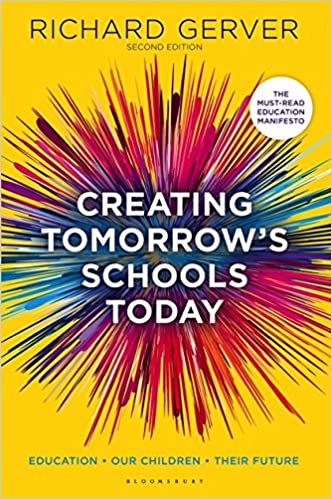
Creating Tomorrow’s Schools Today (Bloomsbury) –
This presents the Grange story in detail, including how they planned and assessed projects.
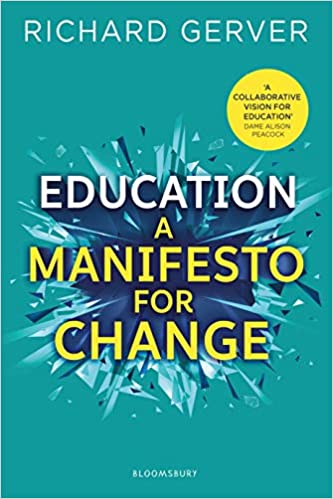
Education: A Manifesto for Change (Bloomsbury)
This explores the real challenges and vision for the future.
The following two books explore the generic skills and attributes we all need to cultivate to live better lives in an exponentially changing world:
Change; Learn to Love it, Learn to Lead it
